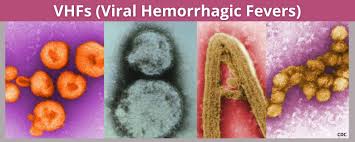Viral Hemorrhagic Fever (VHF), and its offshoot, Lassa Fever have seen an increase in this year, with a recent data released by the Nigeria Centre for Disease Control (NCDC) showing that there have been 2122 suspected cases of Lassa Fever outbreak in 21 states, 411 confirmed cases and 72 deaths recorded in 2024.
Similarly, the Cross River State Health Ministry recently announced a suspected case of viral hemorrhagic fever in old Ndebeji community in Akamkpa local government area.
This type of fever can be spread through contact with infected animals, people or insects.
Speaking on this in chat with our correspondent, Daniel Olatunde, a medical doctor at the University of Osun State Teaching Hospital, Dr. Bibilari Adewusi shed more light on the fever, its symptoms and also the prevention. Below is the excerpts of the interview;
What is Viral Hemorrhagic Fever?
The definition can be taken from the name. When we say ‘Viral’, that means they are caused by viruses. So, there are specific viruses that can cause this kind of disease. And when we say ‘Hemorrhagic’, it means that as part of their symptoms they usually cause abnormal bleeding. Sometimes the bleeding is from the mouth, it could be from the ears, nose; and the reason this disease cause bleeding is because they affect the blood clotting system, they cause damages to blood vessels. On the other part, fever is the elevation of body temperature.
So, viral hemorrhagic fever are group of diseases or illnesses that can cause fever, and as part of other symptoms in the body they can also lead to abnormal bleeding. Example include Lassa Fever, Ebola Virus, which most of us are aware us.
What are the symptoms of these diseases?
Many times, symptoms initially could even resemble things like malaria. it could be body weakness, elevation of body temperature (fever), headache, joint pain; there could be abdominal pain, vomiting or even stooling. But many times, what gives them out is the fact that sometimes there is now addition of bleeding-the person can be vomiting blood or stooling blood, sometimes there can be blood in the eyes (Corea).
For many times in the hospital (except when there are outbreak), when we admit patients like that, it is even assumed that it is malaria, until maybe the person suddenly dies or the person begin to manifest more worrisome symptoms. this is when we may raise a suspicion that it is VHF.
You mentioned that one of the examples of VHF is Lassa Fever. In recent weeks, we’ve seen a surge in the cases of Lassa Fever, what is the cause for the increase?
Lassa Fever has been a cyclical pattern in Nigeria, making it endemic – it means it is common in an area. The recent higher incident is associated with dry season, because in this season the animals move out more, they want to approach human abode. Recently too, you see that everybody is complaining of the heat, so the weather factor is one of the reasons for the increase in the cases of Lassa Fever. This is also the time when people also burn bushes in the name of, they want to get bushmeats. These make the rats that are the carrier or agent of these viruses to leave their abode in the forest to come close to human contact.
Basically, these practices increase the contact of these rats with humans, which resulted in the surge in the number of cases.
Is there a cure for these dreading diseases?
There is really no cure for these diseases, but there are some treatment options available. For Example, Ebola doesn’t really have a cure; even Lassa Fever, although there is an antiviral drug that we call the ‘Ribavirin’ that can be given to infected patients.
Unlike malaria, we know drugs that we can give to achieve cure. But when it comes to VHF there is really no definitive cure. There are drugs that can help the person get better, while the immune system fights the disease.
The only good thing for these diseases (particularly a case of Lassa Fever) is that it is not always deadly, particularly when the person gets to the hospital on time and treatment is insisted on time. Meanwhile, diseases like Ebola Virus, in most cases can lead to death.
This is the advice we always give people, when you are having symptoms of fever, it is always best to visit the hospital, be properly checked and avoid self-medication. This is because, sometimes the rate at which these diseases kills can be very rapid.
What then are the preventive measures?
In terms of prevention (I will stick more to Lassa Fever), ensure that food items are kept away from access to rats because Lassa Fever are always transmitted by rat through their urine and feces. Eating such food leaves people with the disease, so avoid rat contact with your food. Avoid eating bushmeat or bushrats because some of them can harbour this disease. Proper hand hygiene is essential too, especially when taking care of patients who are vomiting or stooling. After disposing off the waste, it is important we wash our hands properly. Also ensure you discard soiled items properly. These are some of the ways to prevent the diseases.
Remember, health is wealth.

